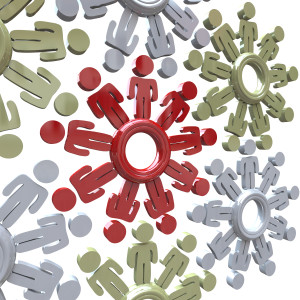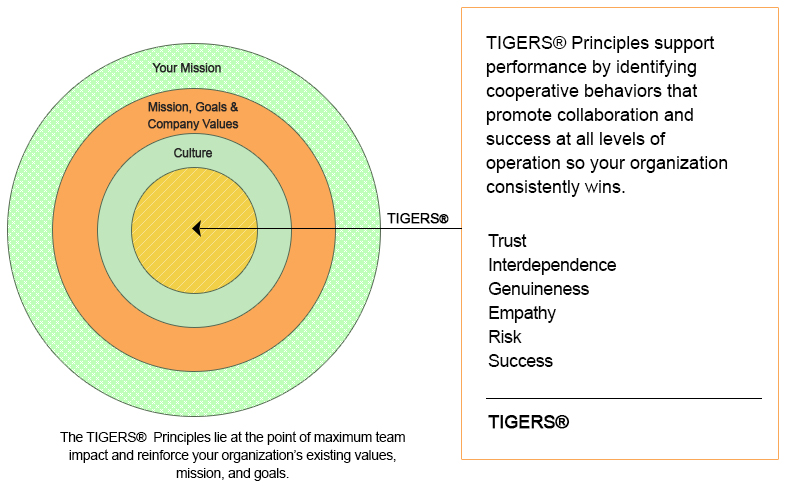
Every organization, even powerhouses like Google, experience higher employee turnover than they’d desire. Google, however, is regularly ranked as one of the best places to work. It offers many different perks and quality benefits for employees, as well as the opportunity to work with some of the top people in the industry.
But even with all that it has going for it, Google is not immune to employees leaving for greener pastures and better workforce interdependence. While employee retention isn’t perfect at Google, the organization is on the right track with a focus on interdependence.
Interdependence in your workplace
Interdependence is one of six universal collaborative principles that grows and develops from a sense of community and the spirit of team support, says TIGERS Among Us. It produces, synergy, which enhances team effort beyond the simple sum total of the team members’ individual skills. The characteristics of a team with high interdependence include high levels of team member information sharing and service to one another’s success. It also involves:
- Respect for diversity.
- Respect for the skills each team member brings to the table.
- Emotional maturity and positive self-esteem.
- Reliance on another’s strengths when required.
- Personal responsibility for personal growth and development.
- Leadership that serves employee growth, development and success.
- Confidence that team members have your best interest in mind.
As stated earlier, Interdependence is one of six researched principles that measurably build cooperation and collaboration in the workplace. Behaviors that support Interdependence result in high performance outcomes for organizations. Interdependence is highly correlated with the other five TIGERS® principles required for high performance work cultures. The other five principles are trust, genuineness, empathy, risk and success. Improvements in team interdependence will also increase improvements in the other principles. As a collaborative principle that builds cooperation in the workplace, interdependence is a team culture workhorse.
Behaviors that foster the TIGERS principle of interdependence include:
- Respect for the different ways people think, learn and process information and using these qualities for maximum benefit to operations, planning and employee achievement.
- Self-awareness and appreciation for others company-wide.
- Intolerance for manipulation and coercion.
- Responsibility and accountability among all team members.
- Win-win problem-solving and the reduction in win-lose and lose-lose conflict solutions.
- Appreciation for diversity.
Some behaviors to watch out for that damage interdependence are:
- Lack of attention to group process that undermines the contributions of thoughtful, context-oriented, and analytical team members.
- Lack of attention to the innate skills employees bring to the table for planning, complex problem-solving and execution.
- Internal competition for rewards and recognition.
- Manipulation, coercion and inappropriate use of power.
- Command and control leadership practices when creativity, innovation and change are desired initiatives.
- Groupthink and intolerance for differences.
- Repeated attempts to change people rather than systems.
- Allowing only leaders to solve problems.
- Allowing only leaders to generate ideas.
- Allowing an “Us and Them” attitude to divide the workplace.
Organizations that screen heavily during employment interviews to identify behaviors that build effective interdependence tend to hire people with an innate capacity to foster team spirit. The benefit is lower employee turnover and much higher team cohesiveness.
According to research by Pew Social Trends, the number of workers in occupations requiring average to above-average education, training and experience with interdependence skills increased from 49 million in 1980 to 83 million in 2015, or by 68%. As automation technology and artificial intelligence increase, this trend will continue to rise indicating that workplace interdependence is a culture change directive. This is because technology is replacing low level skills and higher level and more interdependent skills are now and will be required for team interactions.
Start with a “Thank You” to improve interdependence
One area that Google has right in the interdependence department is employee recognition. This includes events employees are involved in that aren’t necessarily work related. For example, when an employee brings snacks for an early morning meeting, recognize that.
Leaders who understand the importance of recognizing their employees for all of their contributions whether it is a great idea for their current project or bringing in home-baked goods for their coworkers spark more cooperation and sharing. When employees make an effort to make the workplace a great place to be, this is a windfall for leaders. When cooperation is seen recognize it and it will grow.
When team members thank one another and recognize each other’s contributions, interdependence is also strengthened. The entire workforce becomes happier and more productive, making your workplace a great place to be.
Interdependence review for take-away
- Interdependence is one of the six principles required for building high performance organizations. It is the principle that builds cooperation in the workplace in order for your work culture to thrive.
- Interdependence is the universal collaborative principle that grows and develops from a sense of community and the spirit of employee support.
- Because interdependence is highly correlated with the other five TIGERS principles — trust, genuineness, empathy, risk and success — any improvements that you make in this area will positively affect the other principles as well.
Interdependence is crucial for the success of any team or organizational culture and there are identifiable and measurable behaviors that foster a strong sense of interdependence in your workplace. If your culture is weak in interdependence, start with a focus on gratitude and recognition. When employees feel recognized for their contributions, they are happier and more productive in their roles. An added benefit is that you organization will experience higher employee retention, too. A work culture that focuses on interdependence is sure to improve talent retention.
Care to dig deeper into this interdependence discussion?
Consider the following resources for more information:
- Google’s Former Head of HR Says This Is Why Many Top Performers Quit.
- Crampton, Dianne. TIGERS Among Us. Three Creeks Publishing (2010).
- Pew Social Trends Report
- Sample TIGERS Workforce Behavioral Profile for download
Copyright TIGERS Success Series, Inc. by Dianne Crampton
About TIGERS Success Series

We specialize in developing high performance work cultures. Scaled to grow as your organization and leadership performance grows, our proprietary Team Behavior Profile, Management training workshops, and online micro training packages are based on the six principles we have found to be the right mix to make this happen.
The TIGERS 6 Principles are Trust, Interdependence, Genuineness, Empathy, Risk and Success. Born from our many years of business, psychology, and educational group dynamic research, and subsequent four years of independent evaluation, we instill and sustain behaviors that improve work group performance and talent retention for measurable ROI.
For more information or to request a presentation to your group or association, call 1+877-538-2822. To subscribe to our complimentary newsletter, click here.